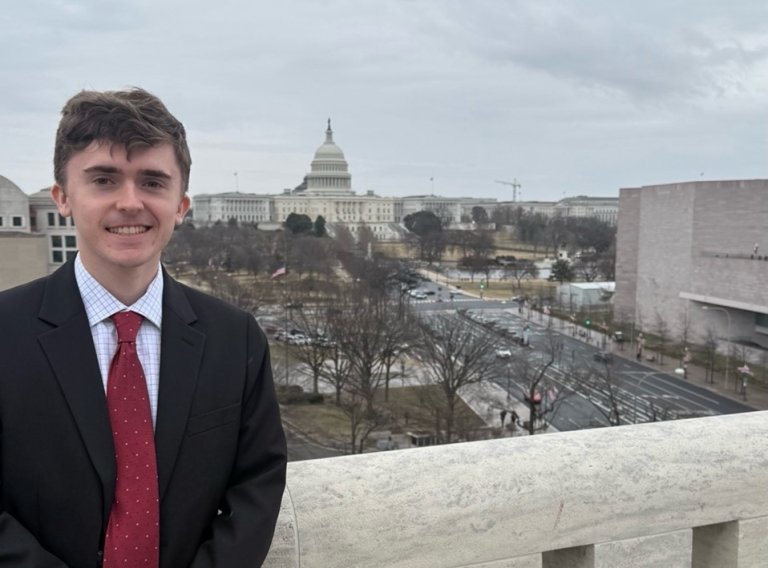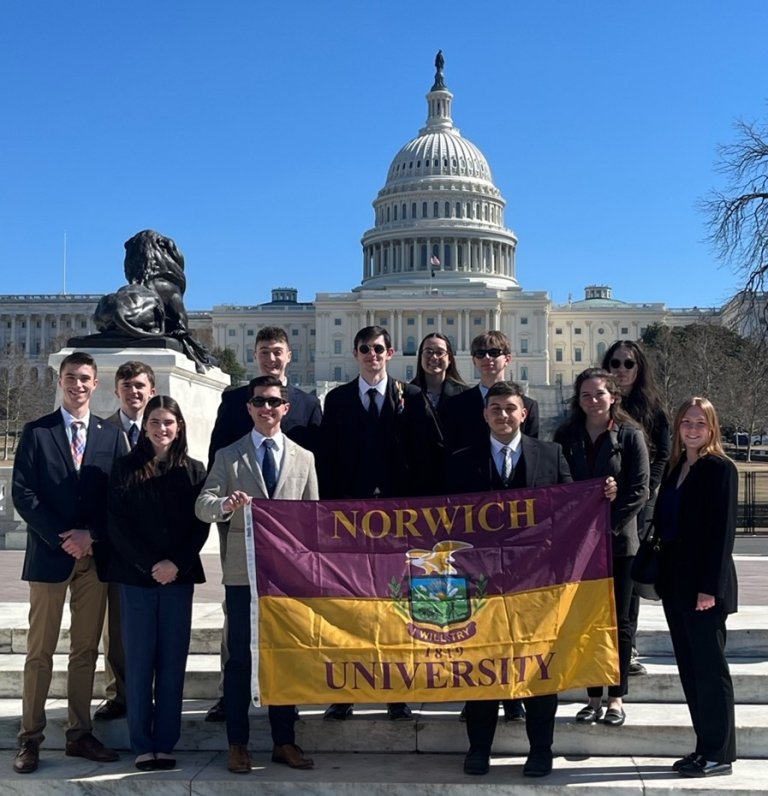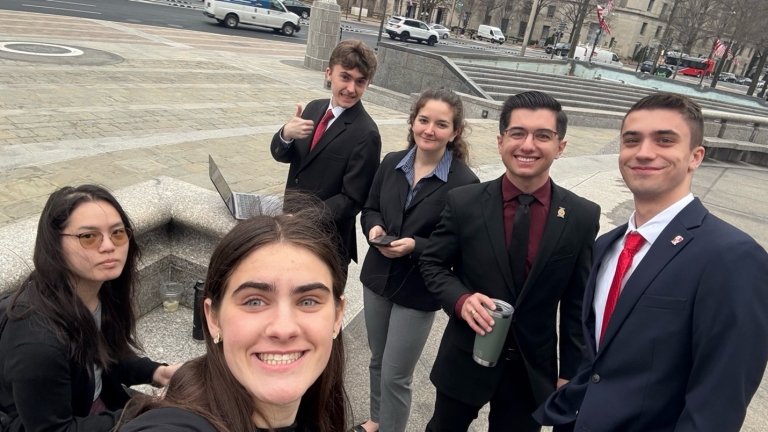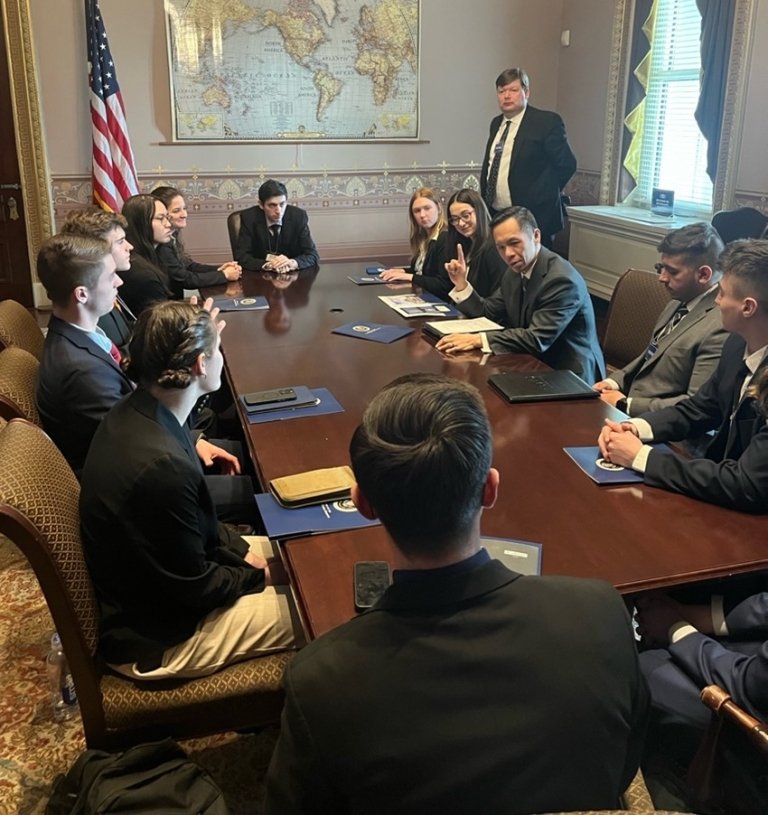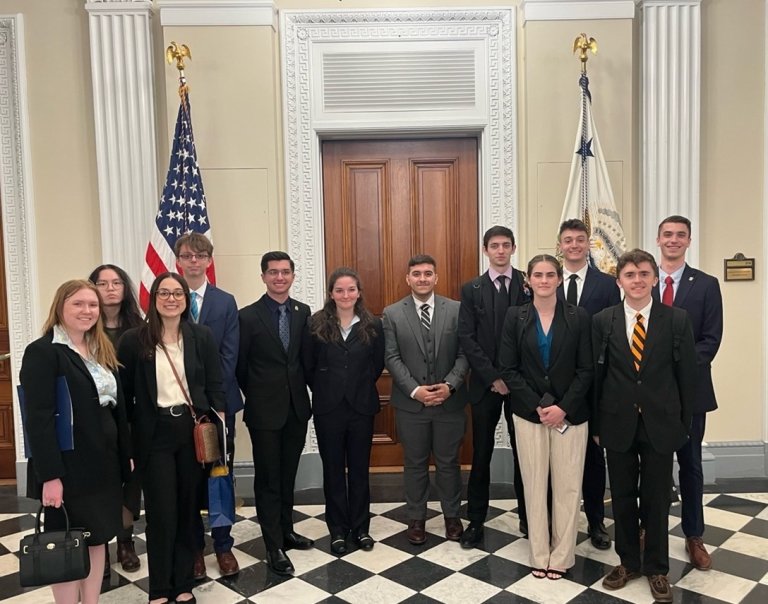Beyond the Classroom: An Immersive D.C. Experience
A semester-long simulation paired with intensive international learning in Washington challenges a Norwich student to think, collaborate, and act under pressure through firsthand experiences.
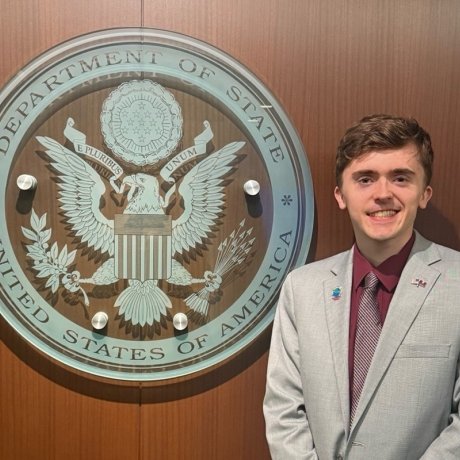
This past Spring Semester (2025), I had the opportunity to participate in a mock, real-world exercise that led to necessary teamwork, creative and collaborative problem-solving and decision-making, and the ability to meet with Norwich alumni and their networks. Twelve students across disciplines, lifestyles, and backgrounds were nominated and selected to participate in this annually provided course that culminated with a weeks-long stay in Washington, D.C.
I was nominated by the Honors Program to participate and was selected to take part in the class taught dually in spring of 2025 by Dr. Michael Thunberg and Dr. Steven Sodergren. Throughout the beginning portion of the semester, we were taught about how different executive agencies were created, as well as their functions, presidential powers in foreign and domestic affairs, and participated in small groups to develop our team-working skills. About two months in we began receiving “injections” which would provide us crucial information to make decisions regarding the issue, that would soon balloon into a multi-state and international issue involving supply chain failures, international terrorists, and preventing the threat of war.
Stepping into the Scenario
The 12 students, being equally divided into two groups, consisted of teams role-playing as key decision-makers under the president of the United States. These roles included the secretary of state (which I played as), and the secretaries of defense, agriculture, and Homeland Security, the attorney general, and the Director of National Intelligence. Each individual had to investigate their role, understand how it operates in the grand scheme of domestic and international politics, and learn how to work together with the other decision-makers in the group to make coherent policy proposals, decision points, and progressions in the scenario. This two-team dynamic provided an opportunity for the two groups to compete for who best handled the situation in the end.
Early in the semester, the so-called injections were far and few between. As we got closer to our D.C. trip, they became more regular. Upon reaching D.C., they were frequently coming in, as not only the injections were being given to our groups, but our requests for additional information brought in a lot more contextualization to issues we were facing.
From Campus to Capitol
Each day was jam-packed with visits, transportation, and other events, and with injections still coming in, this demanded us to stay on our feet — literally — as we raced to get together with our teams to respond to issues as we walked from the Department of Agriculture to the halls of Congress, from the hotel we stayed at to the metro station, from the Department of State to a coffee shop we sought refuge in during a torrential downpour. No matter where we were, at least one member of the team was always working on a response to a recent injection.
Our interactions with Norwich alumni ranged from Department of State employees to congressional staffers, to an alumni event where members of the Norwich family of all ages came out to celebrate the students on two separate trips: the U.S. security policy group (our group) and a group of criminal justice students meeting with and touring different law enforcement and quasi-law enforcement organizations.
Learning from Leaders
Throughout the week, the groups participated in a series of high-level meetings that allowed us to gain insight into the inner workings of federal agencies, international partnerships, and national policy development. The schedule spanned a wide range of fields including food security, defense strategy, cybersecurity, diplomacy, and legislative process while offering a comprehensive look at how complex decisions are shaped in the nation’s capital. Simultaneously, we also had the opportunity to connect with alumni working in Washington, strengthening professional networks and hearing firsthand how Norwich graduates are making an impact in public service.
Across five days, the groups witnessed how policy is developed, negotiated, communicated, and executed. We gained not only a clearer sense of how government functions but a deeper understanding of our own individual strengths, passions, and future career interests. The week was truly an immersive experience at the intersections of leadership, critical thinking, and service to country.
Having insights into decision-making at bureaucratic, legislative, and ambassadorial levels allowed our teams to get a sense of how international issues are handled. Based on the conversations we had, the groups picked up on different ideas on how to solve the problems we faced in our exercise. Ultimately, these interactions brought forward ideas we never would have known or thought about but utilized as we brainstormed.
The Final Test
As the days progressed, the issue we faced grew larger and more complex, including more nations, requiring more investigative work, and making it so certain group members would have to focus on one issue while different members focused on others.
On the last day, the final exercise would test our decision-making and collaboration skills as the scenario escalated and both groups were quickly approaching war. During the regular exercise, our groups could make as many moves as we desired; during the last day, only four moves were allowed in each turn, and with only three turns before the final decision on which group won, we had to be strategic.
In the end, while both teams were closely matched during the majority of the trip, the performance during the end exercise led our group to a victory. While it’s always nice to win, all 12 students left the weeks-long exercise with a new skill set. Whether it was how to work with a team, or how to take information and make collaborative and creative solutions, or how to use the parameters of the position we were in to find a way to make an “all of government” or “unitary” decision based on the situation to figure out a complex and real-world problem. This trip and course offering is one of several experiential learning opportunities that Norwich provides, and one that I was greatly appreciative to be a part of.
Read More
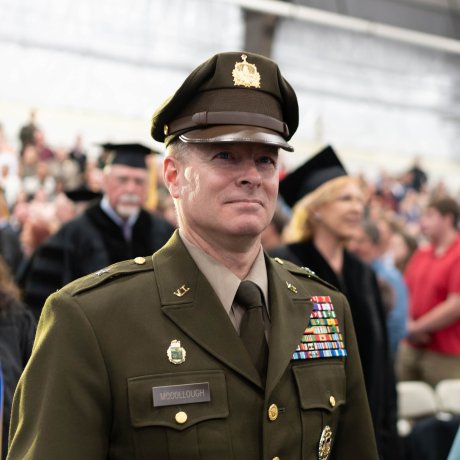
Norwich announces BG William McCollough '91 as commencement speaker
By NU Marketing & Communications Office
As Commencement & Commissioning approaches, the University announces BG William McCollough '91 as the featured speaker during the commencement ceremony.
7 min read
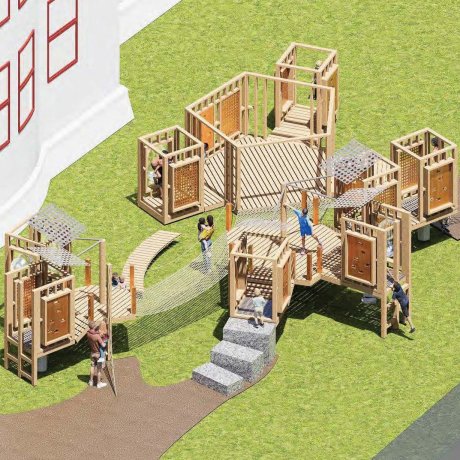
Kellogg-Hubbard Library Plans Interactive Play Structure Through Norwich University Partnership
By Compass Vermont
Link takes reader to an external article.
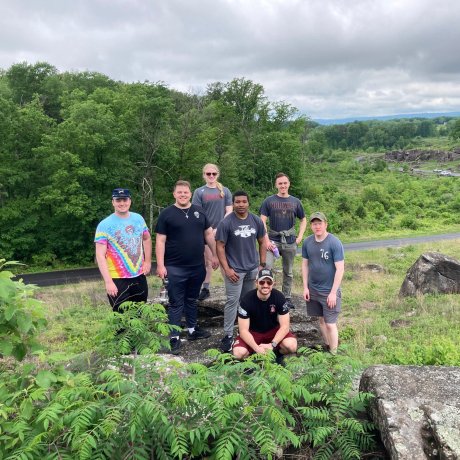
Summer on the Battlefields
By Dr. Steven Sodergren
Under steady rain at Antietam, students bring Civil War history to life by walking the grounds, analyzing strategies, and connecting with the soldiers whose stories still echo across the battlefield.
9 min read

